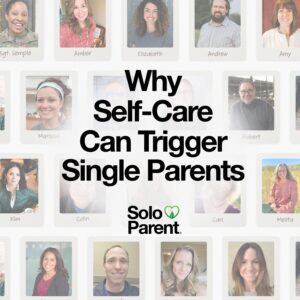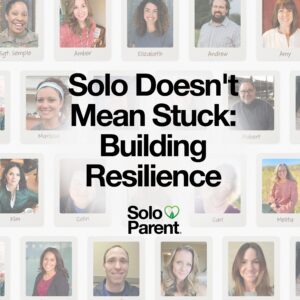It doesn’t take much. A sideways glance. A critical comment. Silence from someone you hoped would speak up. Suddenly you’re wondering if you’ve been dismissed, overlooked, or found lacking.
As single parents, we live without the buffer of a partner to remind us, “It’s not about you.” So everything can feel personal. A coworker’s tone becomes a statement about our competence. A friend’s cancellation feels like rejection. Even our kids’ moods can get twisted into evidence that we’re failing.
This is exhausting, and it matters deeply, because carrying the weight of every perceived slight keeps us locked in shame, resentment, and loneliness. We begin to believe a story about ourselves that simply isn’t true.
Key Insights from This Episode
- Taking things personally is often about assigning intention we cannot actually know.
- Victim mindsets, believing bad things always happen to you, blaming others, or feeling powerless, trap us in unhealthy cycles.
- Practical shifts like considering the source, separating fault from responsibility, and reframing conflict can free us from shame and help us build healthier connections.
Taking things personally is often about assigning intention we cannot actually know.
Marissa Lee, an author and single parent, put it simply: “Taking things personally has to do with assigning intention to someone’s actions, especially when you have no idea what the intention actually is.” That instinct can snowball into imagined narratives that only deepen our hurt.
Robert Beeson, Founder/CEO of Solo Parent, reflected on how divorce amplifies this: “The whole process is intended to point out your flaws. You start believing those harsh comments even years later.” When we’ve lived through betrayal, abandonment, or court battles, it’s no surprise that our defenses are high and our hearts raw.
Elizabeth Cole, a single parent, added how quickly we can spiral: a simple “no” from someone morphs into “you hate me, you never want to see me again.” It’s the speed of that jump, the leap from reality to catastrophe, that reveals how shame speaks louder than truth.
Victim mindsets, believing bad things always happen to you, blaming others, or feeling powerless, trap us in unhealthy cycles.
The conversation unpacked three common victim mindsets:
- Bad things always happen to me. For solo parents who already feel outside the structures of “normal family life,” it can be easy to sink into this narrative.
- It’s always someone else’s fault. Blame may feel validating in the moment but it trains our brains to stay stuck in resentment.
- I can’t change my situation. This outlook can lead to disengagement and despair, convincing us it’s not worth trying.
Recognizing these patterns isn’t about shame, it’s about giving language to the ways we get stuck so we can begin to move forward.
Practical shifts like considering the source, separating fault from responsibility, and reframing conflict can free us from shame and help us build healthier connections.
So how do we stop taking things so personally?
- Separate fault from responsibility. Someone else may have caused your pain, but healing is now your responsibility.
- Consider the source. Before internalizing a comment, ask: Do I actually value this person’s opinion?
- Reframe conflict. As Robert shared, “Conflict can actually build connection if you let it be about actions, not identity.”
- Practice grace. Sometimes people are short-tempered because of their own stress. Giving space without absorbing the blow can keep relationships intact.
- Disrupt rumination. When thoughts spiral, break the cycle—step outside, hold ice, or take a walk.
Listener Question
“How do I ask for help without feeling like a burden? Will there ever be a time when I can pay it forward?”
Elizabeth responded honestly: “You may still feel like a burden, but don’t let that stop you from asking. Over time, that feeling fades.”
Robert reframed it: “When you ask someone for help, you’re actually esteeming them—you’re saying they have something valuable to offer.”
Marissa reminded us that self-sufficiency is a cultural myth. Asking for help not only honors others but also models community for your kids. And yes, you can pay it forward now—through small acts of kindness or sharing your story with other solo parents.
Stay Connected + Get Support
We want to answer any Solo Parent questions you may have. Submit your listener questions HERE.
Additional Resources:



